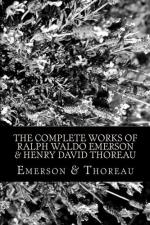|
This section contains 5,638 words (approx. 19 pages at 300 words per page) |

|
SOURCE: Fisher, Marvin. “Seeing New Englandly: Anthropology, Ecology, and Theology in Thoreau's Week on the Concord and Merrimack Rivers.” The Centennial Review 34, no. 3 (summer 1990): 381‐93.
In the following essay, Fisher considers Edward Johnson's apocalyptic‐imbued history of the settlement of New England and its influence on Thoreau.
The title of Henry Thoreau's first book announces an authorial strategy that either failed utterly or succeeded only as irony. It echoes the titles of countless travel books by British and continental visitors and by American devotees of the scenic picturesque. Authors from Irving, Cooper, and Hawthorne to Whitman and Twain, Steinbeck and Kerouac have promoted and occasionally transcended the form. In Thoreau's time such well‐traveled moralists as Timothy and Theodore Dwight told Americans where to go, what to look at, and how they should see it. For them Niagara Falls was a sublime set piece, testifying to God's grandeur and...
|
This section contains 5,638 words (approx. 19 pages at 300 words per page) |

|


